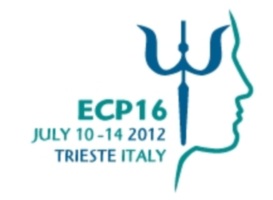The 2012 European Conference on Personality
Lisa Di Blas and Andrea Carnaghi
 The 16th European Conference on Personality (ECP16) was held July 10-14, 2012, at the University of Trieste, Italy. The European Association of Personality organizes biannual ECP meetings in order to facilitate exchanges among personality psychology experts as well as to promote the scientific field among young students. As chairs of ECP16, we believe that the conference in Trieste fulfilled both aims. Many leading experts took part in the conference and an extraordinarily high number of emerging scholars presented their scientific contributions.
The 16th European Conference on Personality (ECP16) was held July 10-14, 2012, at the University of Trieste, Italy. The European Association of Personality organizes biannual ECP meetings in order to facilitate exchanges among personality psychology experts as well as to promote the scientific field among young students. As chairs of ECP16, we believe that the conference in Trieste fulfilled both aims. Many leading experts took part in the conference and an extraordinarily high number of emerging scholars presented their scientific contributions.
The conference counted 555 registered participants, from 46 countries all around the world. The program was particularly strong. Two pre-conference workshops, one on R (C. Caudek) and the other on mediation analysis via MPLUS (C. Barbaranelli), and a pre-conference symposium, “Cognitive Neuroscience on Personality Dynamics”, opened the scientific event. Promoted by APS and chaired by D. Cervone, the pre-conference symposium was aimed at enhancing interdisciplinary scientific communication, and it hosted speakers from both the USA and Europe: A. Abraham, J.A. Bartz, A. D’Argembeau, and R. Cloninger. The Opening Ceremony of ECP16 started in the evening. After P. Romito briefly reviewed the revolutionary contributions of the influential psychiatrist F. Basaglia in Trieste, J. Asendorpf gave his Presidential Address, entitled “The Long Shadows of Early Personality”.
ECP16 keynote speakers were distinguished scientists in different areas of personality psychology: V. Benet-Martinez, R. F. Baumeister, G.V. Caprara, T. Judge, B.W. Roberts, and D. Borsboom. Furthermore, we have to mention two more key speaker: J, Strelau who received the EAPP Life-Time Achievement Award, and L. Penke who was given the EAPP Early Achievement Award. Keynote lectures were well-attended and followed by stimulating discussions.
Thanks to an unexpectedly high number of submissions (about 550 proposals), in addition to 12 invited symposia, we selected 25 symposia and organized 17 paper sessions and 2 poster sessions, resulting in about 250 oral presentations and 200 posters. Three young students received awards for the high quality level of their posters. Contributions covered a very large number of topics relevant to the field of personality research. It is worth mentioning that there were a striking number of contributions dealing with personality and social psychology, personality development, personality and culture, and personality and psychopathology.
Let us add that, thanks to the wonderful weather, with typically sunny summer days, ECP participants clearly appreciated the beauty of the city and the Gala dinner, which was held at the historical castle of Trieste. The conference venue’s only drawback was that the poster sessions were hold in a rather hot room.
We thank the conference’s scientific committee and organizing committee, together with all volunteers, for their invaluable work. We also thank all the participants for their high-level scientific contributions.
The next EAPP conference, ECP17, will be held July 15-19, 2014, in Lausanne, Switzerland. The conference will be chaired by J. Rossier.